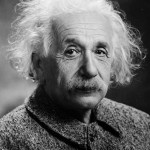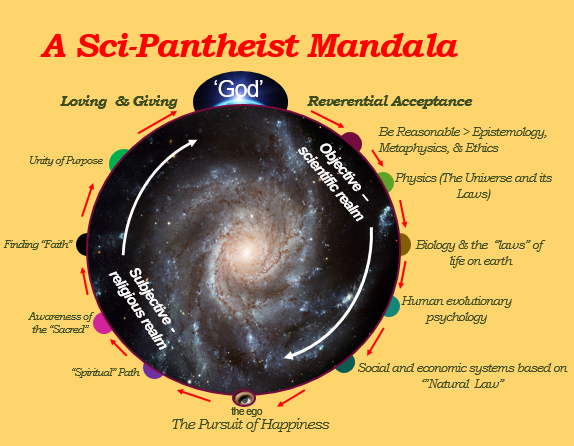 A Scientific Pantheist’s Meta-Ethical Alternative to Sam Harris’s Utilitarianism
A Scientific Pantheist’s Meta-Ethical Alternative to Sam Harris’s Utilitarianism
By Benjamin Yoke
After rising to prominence in the “New Atheists” movement, Sam Harris has become one of the more famous intellectuals in the last decade or so to promulgate an ethical system ostensibly based on science and reason. Like many secularists before him Harris tries (somewhat quixotically) to construct a scientific meta-ethic based on utilitarianism. In this essay I will argue that a scientific pantheist’s worldview delivers a more reasonable, instructive, workable/pragmatic, “scientific”, and profoundly more existentially relevant ethical paradigm.
Harris’s Argument for a Utilitarian Ethic (Synopsis)
Mr. Harris’s ethical system is more or less classic utilitarianism, where utilitarianism is defined as a system of ethics whose central goal is to promote the greatest happiness for the greatest number. Once one accepts his founding, or base, utilitarian premise that “we ought to maximize the well-being of conscious creatures”, he thinks it is then simply a matter of utilizing the scientific method to find out how to maximize such well-being.
Harris’s main arguments, for accepting his foundation for an ethical premise, are as follows:
Argument A. Caring about the well being of conscious beings is the foundation (or starting point) for a reasonable ethical system, because a universe without conscious beings would be a universe without anything that could value well-being and the avoidance of suffering.
Argument B. If we imagine the worst possible universe where all conscious creatures suffer as much as possible, then we have to think that is bad. If you claim you don’t think that’s bad, that maybe there is something worse, then Sam Harris claims he doesn’t know what you are talking about, and he says you don’t know what you are talking about either. Therefore, once we admit that the worst possible universe inherently needs to be avoided, then, according to Harris, we must buy into applying the scientific method to discover how best to move away from suffering to the maximization of well-being.
Argument C. Science can be applied to maximizing something as subjectively experienced as well-being. Because, Harris notes, in medicine the sensation of pain is generally accepted as a “subjective fact”, and thus the “fact” of well-being, as the central goal of conscious beings, can likewise be subjectively, but factually, extrapolated.
Argument D. Harris points out that, an ethical system truly based on science and reason would surely have a great advantage over previous religion based systems. Since virtually all of modern humanity accepts, or uses, and lives with modern technology, it is implicit the we must also except the utility of science that enabled us to create it.
Thus it is understandable and interesting that Harris has attempted to create an ethical system based on science and reason.
A Scientific Pantheist’s Meta-Ethic (Overview), 
as an alternative to Harris’s meta-ethos.
Pantheism is simply the belief that nature and God are one and the same thing, or that the universe or nature as a whole is god. The utility of pantheism, particularly in this discussion, does not turn on metaphysical or ontological arguments for pantheism. Rather pantheism’s utility is meta-ethical. i.e. It is pragmatically desirable to consider the universe or reality as a whole as God, and that’s meta-ethically synonymous with viewing the universe as a whole as being the good.
Perhaps Einstein (the greatest scientist of our era) best expressed the way in which Scientific Pantheism can/should be the basis of a meta ethical system, when he said,
 “A human being is a part of the whole, called by us “Universe.” He experiences himself, his thought and feelings as something separated from the rest – a kind of optical delusion of his consciousness. This delusion is a kind of prison for us, restricting us to our personal desires and to the affection for a few persons nearest us. Our task must be to free ourselves from this prison by widening our circle of compassion to embrace all living creatures and the whole of nature in its beauty.” (bold font mine)
“A human being is a part of the whole, called by us “Universe.” He experiences himself, his thought and feelings as something separated from the rest – a kind of optical delusion of his consciousness. This delusion is a kind of prison for us, restricting us to our personal desires and to the affection for a few persons nearest us. Our task must be to free ourselves from this prison by widening our circle of compassion to embrace all living creatures and the whole of nature in its beauty.” (bold font mine)
As the last portion of the Einstein quote makes clear, Scientific Pantheism’s meta-ethos isn’t just about a concern for the well-being of conscious creatures; it extends concern to unconscious life, and then to the entire universe. Extending compassion to reality as a whole causes Einstein’s prescription to transition, from not just an ethical sentiment, but also to a “transcendent” religious sentiment. But, though it is certainly more like a religion than utilitarianism, scientific pantheism affirms that the best way to know what in fact nature consists of (what the truth is) is through modern science. Unlike in monotheism or deism, the scientific pantheist typically posits that there is insufficient evidence to assume agency/sentience to the universe as a whole. Nor is there enough evidence of a particularly significant (or perhaps any) supernatural element to or “behind” God/nature. However, just as scientists rigorously study nature via the scientific method to approach the most pragmatic, and best, approximation of the truth, scientific pantheists pragmatically hold that acting in accord with such truth (as to what nature/god is) is the good.
It is important to make it clear that a reasonable pantheist believes that only in general (inductively) is nature (the universe) The Good, and thus worthy of the reverence and love one would accord to a god. This general love and reverence is analogous to the love one feels for one’s spouse or friends in that, even though they may have specific flaws (sometimes even awful flaws), in general you love them because, for you, they have more good attributes than negative ones.
Moreover, scientific pantheism thus also offers an ethical hierarchy that tracks the hierarchy of the sciences, from loving the universe as a whole (in general/inductively), and thus choosing to act in accord with the universe’s “laws” as a whole, and then from those universal laws (of physics) deductively down through chemistry, and biology, and through human evolutionary psychology, to the self (see the right side of mandala below). This creates the most coherent and pragmatically useful world view meta-ethos; because it is by definition profoundly in accord with reality, as known by modern science. And, curiously, it also resolves naturalistic fallacy issues.
This resolution occurs because, once one understands the nature of the general to specific meta-ethical value hierarchy (where each value going down the right side of the depicted mandala is a subset of, and subservient to, the values above), where the top value is accepting the universe as a whole, and acting in accord with it’s most general relationships/rules (physics), we see that the fallacy only happens when we think we should act in a accord with a lower (less general) form of natural order that may itself be out of accord with a higher (more general form of natural order).
When we examine this hierarchy of natural order, which tracks the sciences, from the universe as a whole down to the self, two crucial values (that humanity has, as of yet, failed to sufficiently adhere to) become clarified:
A. We should act in accord with the definition/meaning/“laws” of life.
B. We should create and maintain a gracefully sustainable civilization.
 Let’s expand on these two deduced values:
Let’s expand on these two deduced values:
A. We should act in accord with the definition or “Meaning” of life.
i.e. By pantheism, we should accept that an essential part of The Meaning of Life is the same as the definition of life, and is thus a law (normative prescription or purpose) of life…
So, again, if you look at the super-set to subset ethical hierarchy that a scientific pantheist would reverentially accept, on the right side of the Mandala, then we start by accepting that we should act in accord with the universal laws of physics. However, most people are practical enough to generally in principle accept the sane utility of acting in accord with the laws of physics (save for the occasional quixotic attempts at being something such as a breatharian or flying swami). But, when it comes to reverentially accepting what humans are, biologically (accepting the “laws of life on earth”), that means accepting that the Meaning of our lives should in significant part be the same as the physical definition of life, homo sapiens have normally chosen values (and thus actions) that skew slightly (but significantly!) from the reality of the process of life as understood by science. At this critical point in human history, rectifying this clear and deeply significant skewing of values at the middle of the natural value hierarchy should surely be the central task of the scientific pantheist. For what it’s worth, the survival of human civilization almost certainly hinges on it.
This should be common sense: not adhering to the definition of life means death and/or extinction. And yet the vast majority of humans bridle, nihilistic-ally and somewhat insanely (with our mal-evolved ego-centric consciousnesses), at the suggestion that the Meaning (or purpose) of one’s life should be such a “low” thing, as to be the same as acting in accord with the definition of life.
Allowing the definition to become our Meaning, is so important that it is probably the key that, if we do it, will allow humanity to make it through the great (hazardously powerful technological civilization) extinction filter, and thus beat Fermi’s paradox.
So, what is the physical definition of life that (in the sci-pantheist meta-ethic) humans should strive to be/act in accord with? Roughly it is this:
Life is: an individuated metabolic process (thermodynamic dissipative structure) that has become organized around the ability to creatively* sense and respond to it’s environment to avoid its own dissolution. (link)
*To avoid confusion, it should be pointed out that the concept of creativity, as it is used here, doesn’t necessarily require conscious intent. Creativity can be here defined as, any natural process (algorithm) where functional order is formed out of chaos, and at some point in that algorithm a random variable is interjected such that the resulting new order is relatively unique. Some examples: the root ball that any tree in a forest creates is unique, the particular exact path any bee creates to get pollen and nectar out of the flowers in a meadow is unique, and a new species created via natural selection is unique.
Since the definition of life above is derived via understanding life in terms of the universal laws of physics, it is very likely that this definition (or theory of life) would apply to anything we would call life in the universe. On earth the “metabolic process” has been going on (avoided dissolution) for four billion years, and we (along with every other living organism) are the leading end/edge of that profoundly ancient process, that thus far (as long as it is life) will continue to avoid it’s own dissolution. Pretty cool! As scientific pantheists, i.e. as lovers of this universe/reality, and the opportunity to exist in it, a central task as a part of life is to use all the skill that we possess to sense and respond to the environment we inhabit to creatively avoid the dissolution of the four billion year old metabolic process that moves through us, as far into the future as we can influence.
A typical response to the ethical maxim elucidated above is that it is sounds like another form of social Darwinism (broadly defined). It is not. Life is organized around the ability to avoid its own dissolution via sensing and responding to its environment. Evolution through natural selection is only a subset category of the way life can sense and respond to its environment. There are many examples of species in nature that are well adapted enough to their niches that they don’t appreciably evolve (i.e. don’t have to evolve) over time. Crinoids, turtles, cockroaches, species in the kingdom archaebacteria, etc., have been around relatively unchanged for millions or even billions of years. Sensing and responding as individual organisms, or collectively, is sometimes sufficient. In fact, as many dead Nazis “learned” by losing WW II, embracing social Darwinism (“natural” selection) as a core collective ethos often may reduce the odds of your particular portion of the metabolic process being passed on, through reproduction, into the future. Regarding the threats of climate change, nuclear war, AI, or overpopulation, we have a choice: do we sense and respond vitally to the threats to the metabolic process that moves through us? Or do we let natural selection by default run its course? Either way life is likely to continue (though possibly profoundly diminished), but by choosing the former option, we are individually choosing to be in accord with the physical definition/Meaning of life, and life will continue with us (and hopefully even enhanced by us), rather than without us.
B. The Importance of Human Civilization
Doing one’s best to cultivate a gracefully sustainable, peaceful, human civilization that ideally would last millions or even billions of years into the future, is a central value that arises logically from the scientific pantheist’s meta-ethical system.
Why? Because of the profound synergistic survival benefits human individuals accrue by playing positive sum games. For the first 3.5 billion years life existed on earth there was only single cell life. For the last half billion years, one sixth of life’s history, there has been multi-cellular life. That really changed things on our little planet. As per game theory, we can say that for the cells cooperating in an organism life is not a zero sum game. By cooperating, the cells gain more than they give. The sum of the whole together is greater than the sum of the cells separately. That’s synergy.
Due to the phenomenal ability of humans to take advantage of synergistic cooperation, virtually all seven and a half billion of us are now cooperating (more or less) in a worldwide civilization. Currently almost the entirety of homo sapiens is participating in a single worldwide economy. Not only that, but of course we also share language, writing, vast amounts of knowledge, specialized trades and skills, the physical and abstract artifacts of our fore-bearers, etc., etc.. Obviously no other life form in earth’s history has done this. And, if we get it right, and if it functions in accord with the larger biosphere (and the vastly larger reality of which it is but an infinitesimal part) it should be obvious that human culture generally and modern civilization specifically are phenomenal tools for survival, for us, and our genes, collectively, and individually. That is to say, civilization can be a synergistic niche that will work for us, as parts of an individuated thermodynamic structure, to maintain the metabolic process that moves through us into the distant future.
Perhaps the hallmark of civilized behavior, is how we behave in our interactions with any random stranger; normally it’s in a way that’s likely to cause a positive sum game synergistic benefit. It is from this subconscious cooperative understanding that the utilitarian’s maxim of optimizing the well-being of conscious creatures organically really arises. Thus, although well-being is a very important ethical value in a reasonable meta-ethical hierarchy, well-being should not be the highest value in the most reasonable “scientific” hierarchy (rather than being at 12 o’clock, it is at around 4:30 or 5 o’clock on the mandala).
So to conclude, why is scientific pantheism’s ethical paradigm better than Harris’s utilitarianism?
Something like 99.9% of the species in earth’s history have gone extinct. Undoubtedly, life for the organisms in those species continued as it “always” has, until it didn’t. In terms of the laws of physics and the complex nature of chemical reactions, any living system has to be doing a lot of things right just to be alive at all. But nature can be a stern task master, and the extinction rate informs us that it is often the case that an organism (or the members of an entire species) only need to miss the requirements of survival by a tiny margin, and the game is over. From a scientific pantheist’s perspective, utilitarianism’s prescriptions (including Harris’s utilitarianism) are generally correct or close to correct in articulating the “good”, but the meta ethos still misses the mark. And if utilitarianism were to be fully embraced by our species (even though utilitarianism may be a better ethical system then most that have preceded it), then it will still likely lead to our extinction. And, further, since an explicit or implicit utilitarian ethos has powered much of the values of modern civilization, and since human civilization is changing or “advancing” at an alarming exponential rate, such that human caused existential crises are stacking up (AI, climate change, nuclear war, overpopulation, etc.), such that extinction (or at least the premature death of billions) is likely coming sooner, rather than later. So, if Harris’s Utilitarian ethos can be summed up as “maximize the well-being of conscious creatures”, how shall we sum up the scientific pantheism ethos?
It can be summed up thus: Learn to love reality enough, such that we choose to act in accord with nature, in accord with what life is; to creatively avoid the dissolution of the metabolic process that moves through us, as far into the future that we can reasonably influence (the hopeful vision is that eventually this even means billions of years). And, pragmatically, this generally means play positive sum games in our interrelations with fellow humans and with nature as a whole.
If you wish to see the summation above explained a little more deeply, then feel free to examine the -
Problems with Harris’s Utilitarian Ethic & Scientific Pantheism’s Solutions:
(Scroll down, or simply click on the link, for the numbered comment below in order to go to the respective essay in which you have interest.)
1. In the natural world, “The well-being of conscious creatures” is logically and empirically subservient to survival, not vice-versa. (Link)
2. Utilitarianism is prevalent now, due to its being a historical artifact, rather than it simply being the most reasonable non-supernatural basis for a meta-ethos. (Link)
3. “Survival” may be mostly about niche maintenance, rather than natural selection. (Link)
4. For Harris, precisely when and why in biological history does consciousness disconnect, as an artifact of selection for survival, such that its “well-being” becomes hierarchically a superior moral value, above survival? (Link)
5. The crux of the biscuit: the core reason Harris’s utilitarianism, or any utilitarianism, isn’t up to snuff as a meta-ethos, is that ultimately it is too dis-functionally solipsistic and egotistical. (Link)
6. Harris’s incoherent jump: from valuing scientific objective truth, to valuing “the well-being of conscious beings”. (Link)
7. Harris’s Utilitarianism can’t utilize Unity, with a capital U, from monotheistic religion (where God is the unifying concept) or modern materialistic science (with it’s universal laws of physics). (Link)
Which leads us, curiously, to:
8. Is/Ought “Resolved” (Link)
9. Harris’s bootstrapping of the utilitarian value of well-being is a linear un-modern-scientific Aristotelian deductive process. (Link)
10. The scientific pantheist’s position on the well-being and prevention of suffering of non-human conscious creatures: (Link)
11. Isn’t biological survival an inherently selfish concept, and won’t a mandate to reproduce exacerbate overpopulation? (Link)
12. Aren’t Utilitarians concerned about existential threats anyway? (Link)
13. AI (Artificial Intelligence) and Scientific Pantheism (Link)
14. Harris’s ethos is an exacerbation, instead of alleviation, of the separation of consciousness from reality that Einstein (and religious sages) spoke of. (Link)
15. But do humans naturally care about reality as a whole more than the well-being of conscious creatures? And if that is what we should, regardless, do how do we make it happen? (Link)
16. God – Pantheism, Theism, and Atheism (Link)
17. Faith (Link)
18. What is Life? (link)
19. On the Self and Selfishness (Link)
>>>>>>>>>>>>>>>>>>>>>>>>>>>>>>>>>>>>>>>>>>>>>>>>>>>>>>>>>>>>>>>>>>>>>>>>
Conclusion
A meta-ethos based on scientific pantheism would be more coherent, more in accord with the hierarchy of the hard sciences, more in accord with the epistemological methods of science, more unified, more spiritually nourishing, less solipsistic, and much more likely to lead to a sustainable human civilization, than Harris’s utilitarianism.
